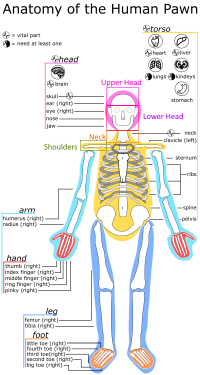Armor
Armor is a type of gear that offers superior protection to clothing, and can typically be worn on top of a it, too. Armor tends to carry heavier movement speed penalties than clothing.
| Name | Move Speed[1] | Layer[2] | Covers | Commonality[3] | Blunt | Piercing | Heat | Electric | Toxic |
|---|---|---|---|---|---|---|---|---|---|
| Armor Vest | -8% | Middle | Torso | 25% | 20% | 60% | 0% | 0% | 0% |
| Kevlar Helmet | -2% | Overhead | Upper Head | 40% | 10% | 35% | 0% | 0% | 0% |
| M1 Helmet | -4% | Overhead | Upper Head | 40% | 10% | 25% | 0% | 0% | 0% |
| Powered Armor Helmet | -4% | Overhead | Full Head | 30% | 35% | 60% | 50% | 0% | 0% |
| Powered Armor | -10% | Middle, Shell | Torso, Arms, Legs | 5% | 35% | 65% | 30% | 0% | 0% |
Armor
A general list of armor in the game as of Alpha 6:
- Note: Some articles of armor have randomized colors. Listed below are example colors.
Armor Vest
A basic plate, strapped to a colonist's or raider's chest to protect their torso from gunshots and some other injuries.
Kevlar Helmet
Companion to the Armor Vest, protects your head.
M1 Helmet
-4% movespeed, -10% psychic sensitivity
Slightly better than the Kevlar Helmet against gunshots, but trades off some other resistances for it. Still a worthy alternative.
Powered Armor Helmet
Helmet for the Powered Armor. Advanced, and is currently the only helmet that covers the entire face.
Powered Armor
-10% movespeed, -10% work speed
Durable but heavy armor. Not advised for 24/7 wearing on colonists due to the movement speed and work penalties.
Also currently the only piece of gear that covers the arms.
Clothing Layers
Each item of apparel or utility gear is worn on a specific location of the wearer's body. That location is determined by two things:
- The body part groups it covers.
- The layer or layers it occupies.
Apparel combinations are limited by layer and coverage - an item cannot be worn with another item that covers the same body parts and on the same layer. Thus, items covering the same parts but on different layers are compatible, as are items on the same layer but with no overlap in coverage. Items that cover multiple layers conflict with items on all layers.
Layers are also used to determine the order in which armor calculations are performed, with the outermost layer's armor applying first, and progressing through the layers until the attack is stopped or there are no more layers.
The layers, from innermost to outermost, are:
- Skin: The closest layer to the body, and mostly used for apparel below the head.
- Middle: The second closest layer to the body, and mostly used for apparel below the head.
- Outer: The third layer from the body, and mostly used for apparel below the head. Note that it will be displayed on the pawn's sprite above all other layers, even though it is considered below the following layers for actual mechanical effects.
- Belt: Technically the fourth layer. A distinct layer for utility items to allow them to be worn alongside any other apparel but not with each other.
- Headgear: The fifth layer, and used for headwear. There are several items that cover body parts typically covered by the other layers however, in which case this will be above them.
- Eyes: The outermost layer. A distinct layer only used for the blindfold
 to allow it to be worn alongside headwear.
to allow it to be worn alongside headwear.
Which body parts currently have items that occupy each of the layers is shown in the table on the below; layers and body parts which are not currently used by gear were omitted. As such, the hands and feet which are not covered by any apparel or any layer, are omitted.
Examples
- You can't wear pants as well as tribalwear, since both cover the "skin" layer and cover the legs.
- You can wear pants and a button-down shirt, since while they both use the "skin" layer they don't cover the same parts.
- You can wear pants and a duster, since while they both cover the legs pants use the "skin" layer while a duster uses the "outer" layer.





